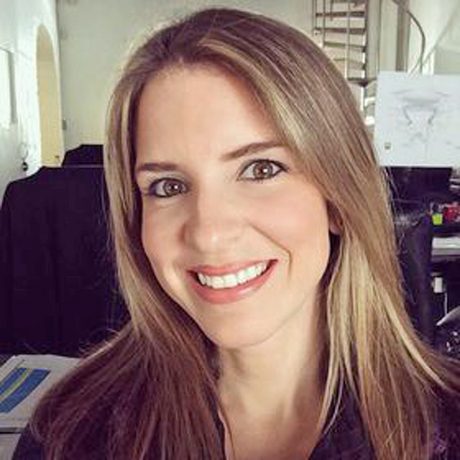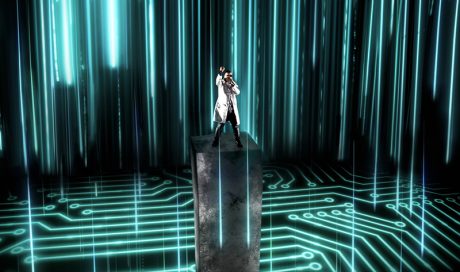
Bianca Moncada is originally from Maracaibo, Venezuela and studied graphic design at Urbe University. With her training as a graphic designer, she started as show designer and video director for a wide range of artists and events. She joined the Miami FL-based Darmah, a production design company in 2014 and is now Creative Director and Partner with Darmah specializing in visual content direction. Her years of experience in Content Direction and Screen Production are reflected in the stunning creative and industry advancing show solutions Moncada and Darmah realize for their clients. Darmah has designed for TV shows and touring acts in the Americas, increasingly recognized for their uber-creative work on award shows like the iHeart Radio Music Awards, Latin Billboards, Latin Grammy’s, and Premios Juventud, among others. Moncada has most recently been involved co-creating virtual performances on Darmah’s dXR stage. She excels at working with new technologies and workflows with the team to create imaginative and other-worldly environments for artists and events. She graciously shared her time with PLSN.
Written By Michael S. Eddy
How did you get into the industry?
I came to the United States around the 2008. I was born and raised in Venezuela and I moved to Miami and studied graphic design; graphic animation. I started as a VJ and then got into video programming. I’m a dancer, as a background, so I think in general, I was always very close to anything creative and being able to use music and combine it with graphics. I started in the visual world and as the years pass by all the sets became a lot more driven towards technology.
That’s where I started putting together concepts and being able to push the creative process. Working with designers and people that do all the technology and programming and the lighting team, being able to bring all that together, I really enjoy. We’ll put together a deck and visualize something and then after all our work together it becomes a reality. It’s amazing.
I first started as a freelancer. In 2014, I met Rodrigo [Proal] at a show where I was actually an art director, not a creative director yet. When we met at the show, we had a good vibe together and I came into Darmah. I’ve been here since then. I think I’ve never been in an environment where it’s so like a family business; it’s not so much of a corporate place. It’s very much like a family; I’ve been with the same team for so many years. A lot of people at Darmah have been here for at least five years. Everybody’s been here for many, many years, and I see why, because we’re in the good—and the bad—all together. We always pushing to create new things.

Were there moments or particular jobs that really set you on the course in your career?
Back in Venezuela, I was young and there was a lack of technology, of course. I would watch the shows in the U.S., the award shows in particular. And I would just dream about those things. I started working with local bands and small shows in Venezuela and that made me say, ‘okay, I’m going to do this for life because I love it’. Because even though I didn’t have the right tools, I still loved to create processes and workflows to make things work. I would take a wedding and make it as if it was a load-in for the Latin Grammys. Sometimes people would think, ‘oh gosh, she’s so intense’, but I thought it would help in the future to to have processes on every show and it did because it’s the same thing right now. When we do shows at Darmah, even if a certain show is not going to get as much recognition or whatever as another, we do it the exact same. As important for the work on the creative process, pushing as much as we can do and bring the best work. I think you fall in love with those processes and you make it your own, and for the team our processes and workflow make us all be a real team. They call us the Darmahanians because literally there are so many of us when we load-in. Basically, we come in as a team and it is, hey, this is the process and we believe in the process, whatever the show is. So it wasn’t a particular job, but I think that when I started working and had those processes back home in Venezuela when I was young, that set my career forward.
So as a creative director, you would agree that an important trait needed for your job is having a level head and being calm under pressure.
For sure. And I would add, it’s basic, but again, it is true, you have to remember that ‘The show will go on no matter what’. So you do the best that you can, but to do that you have to go back to using your time so that you always make better those workflows. If a show didn’t go well you still go back after the show and sit down; have a meeting with your team and see how you can fix whatever you think was wrong. And then you get to do it again, better. So that is also a piece of advice I would give; use the time between shows, depending on everybody’s workflow, use that time to learn; to practice; and to create better processes, so you have things that will work for the next gig. Every time you get better and that let’s you do more creative things.
Who have some of your mentors been who have influenced your work?
I would say Tony Parodi; he is a production manager from Miami and the founder of Acme Productions. He’s very famous in the Latin market, as well as the American market, as a production manager for award shows, but also for touring. English being my second language and going into this business, he taught me a lot. About being responsible and being able to have the right thing to say on an email, being very respectful. Also, executive producer Mary Black-Suarez, with MBS Special Events, she is another important mentor to me. I see her as a woman role model for being a strong, empowered businesswoman. Both Tony and Mary believed in my passion and talent. I am thankful to them, they both gave me opportunities at the start and continue giving, now with Darmah, great opportunities to grow in this business. I think you always have to be thankful for whoever gives you that first opportunity. That is key to this business, even though you maybe don’t see that person again, but you have to remember that person gave you that opportunity. You should always, if you can, say thank you to that person, to that producer, or to that company.

Has there been a challenge you felt you’ve had to overcome in your career?
Sure, all the time. Definitely now is a challenge with the pandemic. Having a team that you don’t want to lose because it’s not really about losing an employee, it’s really about a family that you want to get together. So definitely the pandemic has made us as a team push really hard as Darmah. And we actually not only created the dXR stage and worked hard on this new XR technology for everybody but we’re also talking about new workflows for designers, and new programs that you’ve never used before. So definitely the pandemic brought us a lot of pressure but thankfully we have shows to do and work on and a lot of other people didn’t get to do that. Thankfully we did.
What has surprised you most about your career path?
A lot of people think that people that love this business are workaholics, but I feel that the rush of not feeling like what you’re doing is work, is something very unique. I love what I do and I love learning new things. I feel very blessed to be honest with you. If I look back, I wouldn’t change anything and if I look forward, I look to see that we have so much to learn. For example, now if we’re going to do something in XR, you have to study this technology and know it to be able to put it on the table. Now this is possible; you can say, ‘this we can do’. I think you always need to be a learner. And I really enjoy the process of that.
Images courtesy of Darmah
To see more of Bianca Moncada’s work, go to the Darmah website: https://darmah.com/


